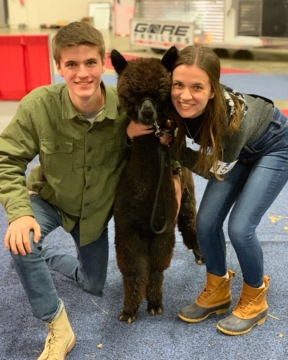Siblings and William & Mary students Grace Phillips ’23 and Daniel Phillips ’25 found unique inspiration for their academic success by helping with their family’s alpaca farm. Now, part of that experience is being highlighted on TV.
Grace, Daniel and their parents Stephen and Nicole Phillips were filmed at Meadowgate Alpacas in Beaverdam, Virginia, last year for the first season of the National Geographic Wild program “Going Fur Gold.” The family appears on episodes four and five of the series that began airing on TV in January as well as livestreaming on YouTube TV and Hulu.
“I think the most fun part of being filmed for ‘Going Fur Gold’ was probably how new the entire experience was,” Daniel said. “We were all so nervous, but excited for the entire filming process because it was something we had never done before. Diving into that completely new, somewhat frightening experience with my family was so much fun.
“It was something that none of us are going to forget anytime soon.”
The series features owners who show various animals. “Devoted owners and their beloved cats, rabbits, chickens, guinea pigs and alpacas strut their stuff in animal competitions across America,” according to the Wild website.

“What surprised me the most about the show was the pace of it all,” Daniel said. “Everything happened really quickly, and it felt like the entire process flew by, although some of that just could have been how nervous I was. It felt like one day we didn’t even know about the show, and the next day the filming was all done.”
The Phillips family’s was one of two alpaca farms featured, according to Nicole. Grace and Daniel appear mostly as alpaca show handlers and with their parents in the show ring.
“Filming ‘Going Fur Gold’ was fun in many ways, but I most enjoyed getting to share the experience with Daniel and my parents,” Grace said. “Being a part of a show was a unique experience for us all. While we all tried to navigate the process, I had the most fun sharing the excitement, encouragement, support and laughter with my family.”
Grace is majoring in biology and psychological sciences, while Daniel is majoring in computer science with a minor in physics. Both have worked with animals all of their lives, with the family converting its former small horse farm over to alpacas in 2017.
Daniel described alpacas as “calm but goofy, sweet but a little sassy.”
Grace’s and Daniel’s roles include everything from assisting with the farm’s website and social media pages, handling sales at the farmer’s markets, generating product ideas, educating the public during farm visits, giving Zoom presentations to corporations and people around the world, handling alpacas at shows, cleaning and feeding the alpacas, and assisting with herd health and births, according to Nicole.
They go home some weekends to help on the farm or serve as ring handlers at alpaca shows, which is the part “Going Fur Gold” focuses on.

“Part of showing is knowing how to best present your alpaca to the judge, which includes keeping the alpaca calm and happy in what can be a stressful situation for them,” Nicole said. “Because Grace and Daniel know the alpacas so well, they make it look easy, though it can be stressful, and that pays off for our small farm in awards. Shows also attract lots of non-alpaca people, and Grace and Daniel are excellent ambassadors for Meadowgate and the industry at large.”
Both students agreed that working on the farm helped them build work ethics they use at W&M.
“It’s a responsibility that you have to take very seriously and slacking, procrastinating or being lazy isn’t possible,” Daniel said. “There’s a lot of discipline involved in caring for animals and working on a farm, because no matter what, the alpacas still need to be fed and cleaned up after.
“They don’t understand excuses, so you just have to get the work done. This has strongly translated to the rest of my life in several different ways. But the most important of them is likely my understanding that when I start a job, I need to finish it, which is an ethic that has served me well countless times.”
Alpacas have not only influenced Grace’s approach to academics, she said, but also her career aspirations and research interests.
“I am currently completing an honors project on the impacts of animal therapy on neurological stress markers in college students,” Grace said. “This project has largely been influenced by the animal therapy program I began with our alpacas when I was in high school. Seeing the huge impact that alpacas can have on individuals sparked my passion for animal therapy research. Eventually, I hope to get my Ph.D. in clinical psychology and utilize animal therapy as a means of helping individuals on a larger scale.”
Jennifer L. Williams, Communications Specialist

